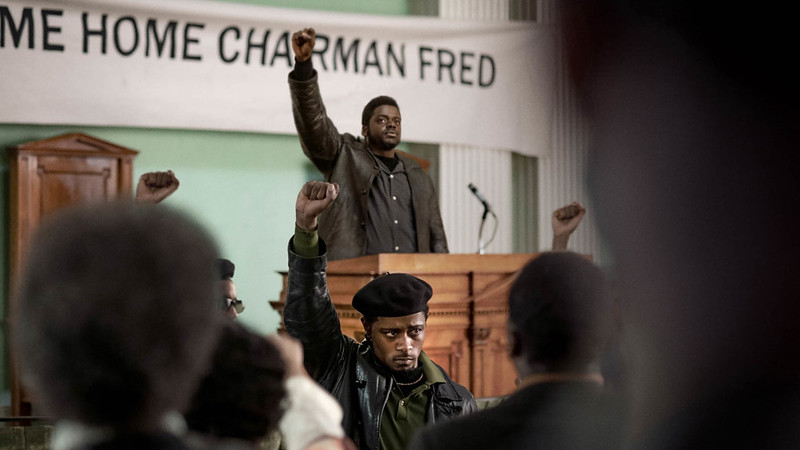What to Watch Verdict
Before the film even reaches the halfway point, there'll be no doubt why 'Judas and the Black Messiah' is a Sundance, Golden Globes and Oscars nominee.
Pros
- +
*Magnetic storytelling.
- +
*Outstanding performances.
- +
*Dynamic sound production.
Cons
- -
*Slightly underdeveloped historical references.
- -
*Exposition heavy.
Judas and the Black Messiah is a gut-wrenchingly intense journey into the web of conspiracies that led to the assassination of Fred Hampton (Daniel Kaluuya). Shaka King's feature-film directorial debut embraces the grit and grift of a crime thriller, to expose the sordid machinations of a government intent on keeping Black people "in check", at all cost.
The FBI's Counterintelligence Program (COINTELPRO) — the once-secret organization that kept tabs on the Black Panther Party (amongst other groups) — started in 1956 with the purpose of disrupting Communist Party "activities" on US soil. In the 60s, FBI Director J. Edgar Hoover extended the program to include domestic groups and any citizens he considered dangerous. In an official memo, Hoover described the Black Panthers as "the greatest threat to internal security of the country." He implemented what the Bureau called "endeavor[s] to expose, misdirect, discredit or otherwise neutralize" against the Black Panthers nationwide.
You can kill the revolutionary but you can't kill the revolution.
Fred Hampton
It's hardly surprising to learn that once the agency noticed Fred Hampton — the young charismatic leader of the Black Panthers' Illinois chapter — making rousing speeches and rallying the city's marginalized communities into a coalition, he found himself in Hoover's crosshairs...literally.
Judas and the Black Messiah shuns the traditional biopic format and instead adopts the suspenseful driving pace of a noir-style thriller.
Everything from the sound production, song selection, costumes and color palette work in concert to turn back time and bring 1960s Chicago to life. Giving over to the narrative's rhythm and flow is easy. In short order — and in a character-revealing fashion — audiences meet William O'Neal (LaKeith Stanfield) and witness a seedy encounter between him and FBI agent Roy Mitchell (Jesse Plemons). With precise crafting, King's direction lays the groundwork for an intense conflict built around Fred Hampton and dissects the treachery, about to play out, with care.
Stanfield's adroit portrayal of O'Neal slowly reveals (thankfully, showing rather than telling) an unsettling portrait of a man who lacks any shred of integrity. From his frequently hunched shoulders to his constantly shifting gaze, Stanfield's O'Neal is the kind of man strictly out to save his own skin. It's a marriage of perfect casting (no shade intended) and direction resulting in a performance by Stanfield that can be best described as award-worthy.
We first meet a self-possessed and fiercely committed Fred Hampton at college. The difference between the direction he's chosen for his life and how O'Neal lives couldn't be more apparent. It only grows more so as their relationship evolves and deepens. Seeing Hampton, as he begins to move with purpose, leads to peering into the inner workings of the close-knit group of loyalists in the Black Panthers Illinois chapter. This supporting cast of characters is a mix of volatile personalities that add depth and perspective to this story. The end result is a realistic presentation of the Black Panthers' community involvement and activism. For all the fervor and magnetic speeches on display, this part of the storyline is what makes O'Neal's charade that much harder to watch unfold.
The latest updates, reviews and unmissable series to watch and more!
King dovetails this silent byplay on what lies at the heart of each man into the insidiousness of the COINTELPRO operation at work. Even as the plot develops and the players fall into place, there's an ever-growing sense of foreboding underlying it all. These twin story arcs subtly drive home the fact that viewers are witnessing a life (and movement) deliberately being destroyed.
In the current climate, it's a risky move to choose to fold Fred Hampton into a much larger narrative, rather than sticking to a narrower biopic on the man and his legacy. But the reality of the FBI's COINTELPRO initiative and Fred Hampton are inextricably linked. So, marrying the two, in a film, in no way shortchanges the legacy of Fred Hampton. In fact, it's vital to shine a light on this, as well as on Hampton’s more contemplative and sensitive side, as he meets and becomes involved with fellow activist and Panther, Deborah Johnson (Dominique Fishback). These moments not only inject timely bits of humor and lightness into the mix they keep the film's tone from becoming too grim.
The sheer forcefulness of Daniel Kaluuya's portrayal of Fred Hampton pulses with a soulful conviction and vibrancy. His presence is undeniable and makes his every onscreen moment positively magnetic. It should also be noted that Fishback is sharp and savvy as Johnson. She imbues the part with an understated grace that kept what could've been a minor character from fading too far into the background. The quiet strength of the chemistry between the two does more to illustrate how profound a loss Hampton was, for those left to continue than anything else could.
If Judas and the Black Messiah has a weakness, it's in the story arc that revolves around the off-screen dismantling of the Black Panther movement. The plot progression relies too heavily on assumed knowledge about key members of the Black Panthers with allusions to other "dirty tricks" campaigns. But the film does little to ground its audience by providing many details. King focuses on honoring and embracing the legacy of Fred Hampton without compromise.
From beginning to end, this talented ensemble brings that world to life — turning in astounding performances that articulate a call to action. Getting invested in this plot is the easy part. Reconciling exactly how the struggle for fair treatment for Black people seems to be backsliding, however, is certain to take more time. Prepare to meet a folk hero worthy of the praise he receives but, keep in mind going in that Judas and the Black Messiah is far more than just a biopic hat-tip to Fred Hampton. It's a skillful rebuke, a heartfelt lamentation, and a harrowing reminder that all skin folk, ain't kinfolk.
Ro is a Rotten Tomatoes approved film/tv critic, writer and host on several of the MTR Network's podcasts. She's a member of the San Diego Film Critics Society and the Online Association of Female Film Critics. She's a former culture columnist for San Diego CityBeat (may it rest in peace) with a serious addiction to genre fiction, horror and documentaries. You can find her sharing movie and book recs and random thoughts, on her podcast I Talk Sh!t and Read or in her newsletter, Shelf Envy.


